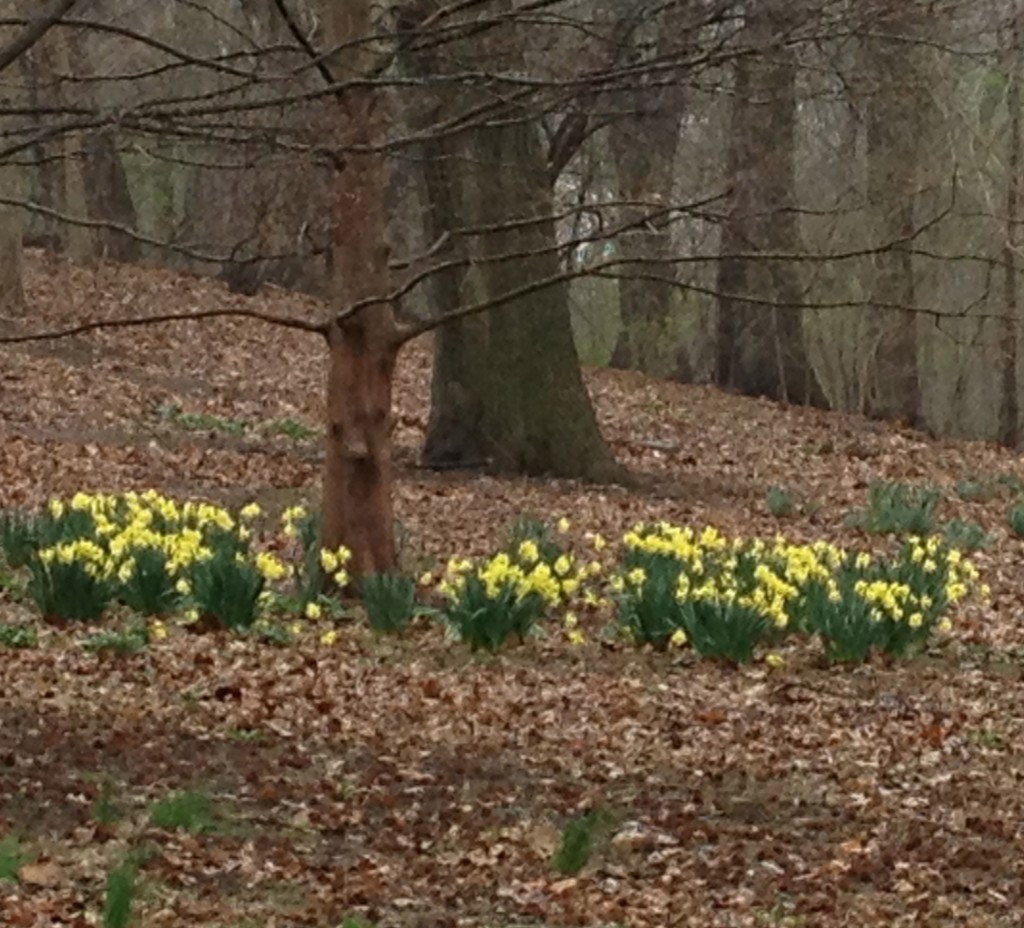 Nature’s first green is gold,
Her hardest hue to hold.
Her early leaf’s a flower;
But only so an hour.
Then leaf subsides to leaf.
So Eden sank to grief,
So dawn goes down to day.
Nothing gold can stay.
— Robert Frost
Nature’s first green is gold,
Her hardest hue to hold.
Her early leaf’s a flower;
But only so an hour.
Then leaf subsides to leaf.
So Eden sank to grief,
So dawn goes down to day.
Nothing gold can stay.
— Robert Frost
Robert Frost was born in San Francisco, but moved as a boy to Lawrence, Massachusetts after his father died. Resettled in New England, Frost’s mother became a Swedenborgian and baptized her son in the religion. Though Frost left the church as an adult, I think that much of his poetry reflects the Swedenborgian tenet that everything in the natural world has a spiritual dimension. Frost lived and was first published in Britain, but he has long been considered New England’s unofficial poet laureate. Like Norman Rockwell, our other popular chronicler who’s undergone a bit of revisionist biography lately, Frost is really neither folksy nor simple. Dark, conflicting, and deep channels of insight run through just about everything he wrote. 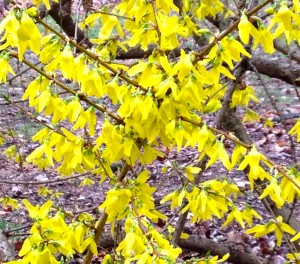 ‘Nothing Gold Can Stay’ is a case in point. It moves at the serene pace and with the emphatic rhythms of a hymn played on a pipe organ. Though it’s laying out a case, it’s much more sermon than argument. And, like so many of Frost’s poems, it’s steeped in the truths of nature. Gold is the first real color of spring in New England. I saw it for the first time this year (weeks later than usual) in the wands of our old willow tree. Next, I caught it flashing at the feeder; spring had repainted the drab brown of the male American goldfinch a
‘Nothing Gold Can Stay’ is a case in point. It moves at the serene pace and with the emphatic rhythms of a hymn played on a pipe organ. Though it’s laying out a case, it’s much more sermon than argument. And, like so many of Frost’s poems, it’s steeped in the truths of nature. Gold is the first real color of spring in New England. I saw it for the first time this year (weeks later than usual) in the wands of our old willow tree. Next, I caught it flashing at the feeder; spring had repainted the drab brown of the male American goldfinch a 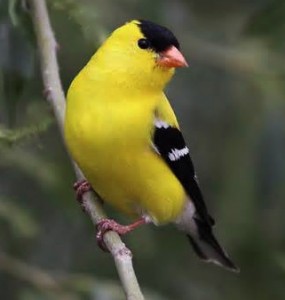 bright, come-hither lemon. A day or two later, it turned our forsythia chrome yellow. Then it burst into life among the daffodils: a blatant, seemingly unstoppable color. Though, as usual, Frost gets his nature right. The yellow doesn’t last. The forsythia bush with “its early leaf a flower” is already subsiding into leaf. Then comes Frost’s great kicker: “So Eden fell to grief.” From examining the delicate particulars of early blooms, the poem suddenly expands to encompass the most monumental of subjects: the fall of man. The final couplet is like an “amen.” The sermon is ending. “So dawn goes
bright, come-hither lemon. A day or two later, it turned our forsythia chrome yellow. Then it burst into life among the daffodils: a blatant, seemingly unstoppable color. Though, as usual, Frost gets his nature right. The yellow doesn’t last. The forsythia bush with “its early leaf a flower” is already subsiding into leaf. Then comes Frost’s great kicker: “So Eden fell to grief.” From examining the delicate particulars of early blooms, the poem suddenly expands to encompass the most monumental of subjects: the fall of man. The final couplet is like an “amen.” The sermon is ending. “So dawn goes 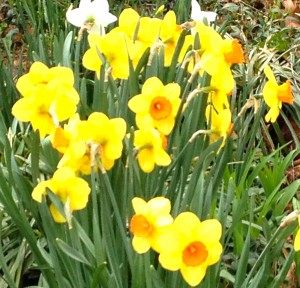 down to day.” The last chords of the hymn echo back through the pews of this short, perfectly constructed poem: “Nothing gold can stay.” I’ve loved Frost’s poems since childhood when I took them at face value. A boy swinging on birch branches. A spider on a flower. A horse stopping in a snow-filled woods. Now they seem much more complex — and deeper — and more beautiful. Now they’ve become for me what Frost, towards the end of his life, proclaimed a poem should be: “A momentary stay against confusion.” What’s your favorite Frost poem — and has it changed for you, too, over the years? Write to me in the comments section below. I’d enjoy hearing from you! For more poems by and information about Frost, please visit: https://www.poets.org/poet.php/prmPID/192
down to day.” The last chords of the hymn echo back through the pews of this short, perfectly constructed poem: “Nothing gold can stay.” I’ve loved Frost’s poems since childhood when I took them at face value. A boy swinging on birch branches. A spider on a flower. A horse stopping in a snow-filled woods. Now they seem much more complex — and deeper — and more beautiful. Now they’ve become for me what Frost, towards the end of his life, proclaimed a poem should be: “A momentary stay against confusion.” What’s your favorite Frost poem — and has it changed for you, too, over the years? Write to me in the comments section below. I’d enjoy hearing from you! For more poems by and information about Frost, please visit: https://www.poets.org/poet.php/prmPID/192


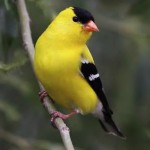
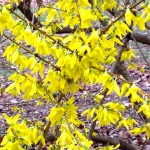
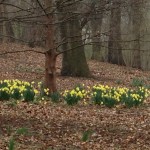
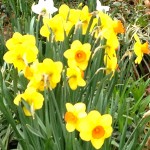
a recent drive along the small back roads from London to Oxford gave me the first sight of Spring: the daffodil; a recent walk to my gardening spot in Central Park (where I volunteer) and another “host of golden daffodils” and two lovely white egrets at the pond assured me that Spring had followed me from England. Lucky me: so many blooms: definitely a “sight for sore eyes” after the long and cold winter.
The dregs of winter linger on in the Berkshires, Annette, where the golds of spring are actually staying much longer than usual. Or are the daffodils just frozen solid on this chilly damp morning?
“…the road less traveled.” He’s right on that one too. It’s made all the difference.
I like that he was sorry he could not travel both roads.
Dear Liza,
How informative this is regarding Robert Frost, not only the pleasure of gold but
learning.
Forsythia is my game. We used to cut it down (illegal I know), hiking in the woods
and then force it to bloom indoors. I loved watching it turn yellow, it bought the
outside inside and a lot of cheer with it.
I’m constantly taking the 79th street bus crosstown where I have the immense pleasure of seeing those golden branches spilling over.
Beata
It is the most cheerful color, isn’t it? A burst of brightness after the monotones of winter!
Liza, thanks for getting me to think about poetry again. “The Pasture” (below) has been a favorite of mine for many years. When I taught 5th and 6th Grades, I had the kids memorize and recite it.
I’m going out to clean the pasture spring;
I’ll only stop to rake the leaves away,
(And wait to watch the water clear, I may):
I sha’n’t be gone long.—You come too.
I’m going out to fetch the little calf
That’s standing by the mother. It’s so young,
It totters when she licks it with her tongue.
I sha’n’t be gone long.—You come too.
The poem is simple and sweet and beautiful in many ways, and it was easy for the kids to learn and understand. I don’t remember ever talking with my students about the invitation, or the speaker’s desire for company while doing those two small chores, but for many years, as a single guy, this poem touched me with a yearning for company in my own life. There are things of beauty and meaning all around us that we often experience and reflect on when we are alone, but to be able to share those good things, and the yearning to share, that’s a big part of human life. Do you think Frost have that in mind when he wrote “The Pasture”?
So nice to hear from you, Curtis. For some reason, I’ve always imagined that Frost was talking to a child, perhaps a grandchild, when he wrote it. But it is a sweet sort of mystery, isn’t it? I need to find a good biography and read up on him. I find the whole Swedenborgian thing fascinating, too. More to come!